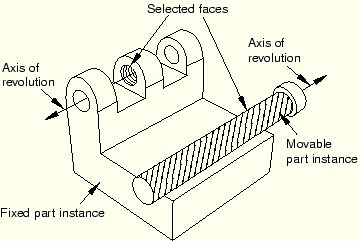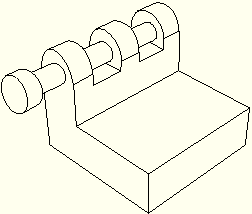
Select Constraint Coaxial from the main menu bar to apply a constraint that positions a movable part instance so that the axis of revolution of a selected face is coincident with the axis of revolution of a selected face of a fixed part instance. All position constraints are features of the assembly and can be suppressed or deleted using the Feature Manipulation toolset.
Coaxial from the main menu bar to apply a constraint that positions a movable part instance so that the axis of revolution of a selected face is coincident with the axis of revolution of a selected face of a fixed part instance. All position constraints are features of the assembly and can be suppressed or deleted using the Feature Manipulation toolset.
The selected faces of the movable and fixed part instances must be either cylindrical or conical. In addition, the coaxial constraint can be applied only to three-dimensional part instances. For more information, see “How the position constraint methods differ,” Section 13.4.2.
To constrain two part instances with coaxial faces:
From the main menu, select Constraint Coaxial.
Coaxial.
Tip:
You can also apply the coaxial constraint using the ![]() tool in the Assembly module toolbox. For a diagram of the tools in the Assembly toolbox, see “Using the Assembly module toolbox,” Section 13.8.
tool in the Assembly module toolbox. For a diagram of the tools in the Assembly toolbox, see “Using the Assembly module toolbox,” Section 13.8.
ABAQUS/CAE displays prompts in the prompt area to guide you through the procedure.
Select cylindrical or conical faces from the part instance that will move and the part instance that will remain fixed, as shown in the following figure:

ABAQUS/CAE displays arrows along the axis of revolution of the selected faces.
From the buttons in the prompt area, do one of the following:
Click OK to accept the direction of the arrow along the axis of revolution of the face of the movable instance.
Click Flip to reverse the direction of the arrow along the axis of revolution of the face of the movable instance, and click OK.
ABAQUS/CAE positions the movable part instance so that the two axes are coincident and the arrows point in the same direction. The orientation of the fixed part instance remains unchanged. The effect of the coaxial constraint with the arrows selected as shown above is illustrated in the following figure:

If the coaxial constraint conflicts with existing constraints, ABAQUS/CAE displays an error message and cancels the operation. To avoid the conflict, you can try reversing the selection of the part instance that will move and the part instance that will remain fixed. Alternatively, you can convert the existing constraints to an absolute position and reapply the coaxial constraint.
